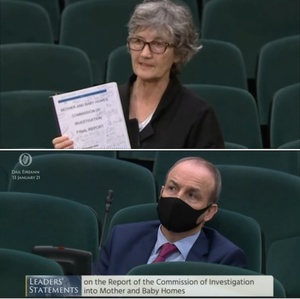 From top: Minister for Culture, Heritage and Gaeltacht Affairs Josepha Madigan flanked by Edinburgh Festival award winners Pat Kinevane (left) and Gina Moxley last week; Eamonn Kelly
From top: Minister for Culture, Heritage and Gaeltacht Affairs Josepha Madigan flanked by Edinburgh Festival award winners Pat Kinevane (left) and Gina Moxley last week; Eamonn Kelly
When the Republic of Ireland football team arrived back in Dublin airport in the summer of 1990 to be greeted by up to a million delirious fans for their world cup exploits there was a moment when a podium and microphone were up for grabs.
The contenders for the prize of addressing the crowd and basking in the glory were Jack Charlton and Charles Haughey.
Charlton placed a shoulder in front of Haughey and easily left him for dead, as he had done to opponents throughout his footballing career. Charlton took the plaudits.
Contrast this with Josepha Madigan beaming comfortably between Pat Kinevane and Gina Moxley, basking in the glory of Moxley and Kinevane’s deserved separate Edinburgh Fringe wins.
That’s politics.
Even the investment of €680,200 from Culture Ireland for the promotion of Irish arts globally, conveniently touted by the minster at the celebration, a fund to aid artist travel, could easily be regarded by a stretching cynic with a darkly humorous streak, as a fund privately designed to encourage the mass emigration of wacky creatives.
Political hierarchy is perhaps best defined by who stands closest to the public money, with circles of influence extending from the elected few, literally, out into the wider community, where queues of friendly association are formed in a bid to win best position for a piece of the pie.
But what if the elected official you have been grooming for a few years turns up implicated in a possible scam elsewhere? What do you do?
Do you throw out all that networking, all the angles and “chance” meetings, engineered to exchange smiles and first names as you jostle for position? Do you just throw all that away? No. You wait. You sit quiet and you watch and you wait.
Because these are hard times for the arts. In Dublin the arts are being systematically squeezed out of existence, a problem outlined in last Saturday’s Irish Times.
In the The National Campaign for the Arts (NCFA) pre-budget submission, published on July 16, at the height of the so-called swing-gate affair, the arts body went out of its way to congratulate Josepha Madigan on the tweak to welfare law that allows artists to spend the first year of unemployment trying to make their art economically viable.
After that, artists go onto employment activation, which only kicks in after a year anyway for everyone. Still, there is a concession there, that for a year artists may pursue their art rather than pursuing “real jobs”.
But there is no acknowledgment of the miserly-funded arts scene that artists are supposed to knock a living from; nor the fact that commerce has created a cultural wasteland devoid of venues and opportunity; nor the fact that it is widely recognized that art is not a business anyway and depends on subsidy.
Nor the fact that artists are being given a year to make their art a business or go get a “real” job, which amounts basically to a job in the service or hospitality sectors.
Instead the NCFA congratulates the minister on this “initiative”; one which is unlikely to ever really affect the well ensconced middle-class personages that make up the NCFA.
These are the administrator and managerial class of the arts, many who have created funded lifestyles from the activities of grassroots arts practitioners. It makes little difference to them if the infantry of their sector are herded into service jobs after the year’s grace to laughably attempt to make a business from art in this skewed, under-funded environment.
That’s all down there. Up top, the cream of the sector mix with the political and business classes and they are all essentially the same people from similar middle-class backgrounds.
In this kind of culture, criticism of these realties is written off as individual “bitterness”, as remarked upon recently by the playwright Lisa Tierney-Keogh, who got a break with the Abbey in the aftermath of the protests against the skewed representation of women playwrights on the Abbey stage. Note that the break only came after the ‘Me-Too’ outcry. An outcry by a movement, not by an individual.
But the reverse of this idea of criticism being bitterness, is that non-criticism can then become seen as co-operative, even in a situation that is endlessly producing socially unjust outcomes. Non-criticism becomes smiling acceptance and, on the face of it, everything appears to be just fine.
Ireland has a track record in political silence. In Peter Lennon’s excellent social documentary, “The Rocky Road to Dublin”, recently restored by Sé Merry Doyle and the Irish Film Board, the writer Sean O’Faolain comments on this attribute of Irish culture when he describes the Ireland that emerged from revolution as a society…
“…which was without moral courage, constantly observing a self-interested silence, never speaking in moments of crisis… a society in which there are blatant inequalities…”
When you hear that from 1967 and compare it to today’s cultural landscape it makes you wonder have we changed as much as we often like to believe we have.
An idea that is further reinforced when you learn that this Cannes award-winning film and it’s critique of Irish culture has never been shown on Irish television.
On the other hand, there often seems to be thoughtlessness at work in much of Irish social injustice. Thoughtlessness more than malice. Ignorance more than design.
This came to mind when watching Margaretta D’Arcy and Finn Arden’s documentary about wheelchair access, “Welcome to our World”, made to highlight the difficulties the playwright John Arden was facing in later life when confined to a wheelchair; problems which are faced everyday by wheelchair users.
And the defining element of the problems they encounter is largely due to thoughtlessness or a “sure it’ll do” attitude.
But, and here’s the thing, it is assumed that you are “happy enough” if you just endure those thoughtless difficulties in silence. But if you criticise, it is not assumed that your criticisms are valid, but rather that you are, personally, “difficult”.
The result is that the thoughtlessness that is parent to so many Irish social injustices is never unmasked and nothing ever changes. Because to complain is to be “bitter”. And only a few stronger individuals ever complain.
Few enough to be easily isolated and labelled “difficult” or “a bit of a character”. In this way the silence is preserved along with the political inequities such silence encourages and cultivates.
Eamonn Kelly is a freelance Writer and Playwright.
Previously: Eamonn Kelly on Broadsheet







This article kind of careers all over the place; how many years does the author suggest that artists should be allowed live off the state while they try and make a go of it – five years? Ten years?
I think that there are a lot more deserving uses that this money could be put to, personally.
‘Rocky Road to Dublin’ has been shown on television, I remember watching it.
It was broadcast with much fanfare by RTÉ in May of 2006, with seemly endless publicity and a supporting feature about the making of the film.
+1
Seems like this article has a few inaccuracies
ur hugely missing every point. anyway, ur ignorance aside, what would you use aaaaall that money for? would you take everyone off welfare? just do away with it all .. sure you dont need it ..why would anyone else? .. ive seen u here before, you have no ability to see anything outside of your own world.
u ok, hun?
+1
Build a few metro lines in Dublin, for starters.
and what will happen to all the people losing their welfare? not a problem? they should’ve gotten safe well paid jobs, like you and I, right? No welfare for anyone. You all have to go out and do just as Rob_G does in the world, or better. Anything less and into the sea you get.
lol metro lines. ok, everyones off welfare, metro lines are in. all hail our new leader, Rob_G. I bet you’re a staunch fine gael voter are you? your clear casting aside of the poor to make way for the rest would suggest so.
I don’t know how you managed to take that extraordinary interpretation from what I said; of course people who lose their jobs should be able to claim social welfare, they just shouldn’t be allowed to claim it for year after year without any questions asked,
And yes, the country is at full employment, there should be no problem for anyone who wants to work to find a job.
As pointed out by me yesterday, why do ministers always have to do these photo ops?
Why not civil servants? I for one would welcome a look at what our current mandarins look like, given their largely unacknowledged power….
Thank you Broadsheet for highlighting the fact that our ministers are spending their time posing for silly photos rather than doing their jobs.
Josepha’s signature outfit style seems to always be ‘slightly inappropriate’. This does not inspire confidence in her judgment nor does the amount of time she must spend choosing them. It looks like the Dail fashion show has gone to female TD’s heads. Life’s a catwalk!
Next time I will be voting for someone who looks like they work hard and take their job seriously.
Her “outfit”? I think she looks very well. Enough of the laicised nun and christian brother look of the Irish culture scene.
Could do with a few tattoos though.
Someone like Mick Wallace? Or was he a slacker because of his casual dress?
What’s wrong with this picture is that funding is being given to actors to write, direct (in some cases) and perform their own solo pieces. Where are the working actors, where are the playwrights, the directors? The self penned one man/woman play is not a symptom of the present crisis, it’s partly the cause of it. The Project theatre is more closed than open these days. The Abbey doesn’t know it’s left from its right and the Gate just picks hits from London and transposes them. The regular funded companies, Fishamble, Rough Magic and Druid, are run by people who have been at the helm for decades each, combining 70 years plus. And all the while actors who have given a life to Irish theatre are kicked to touch in order for the one man play to triumph so that Culture Ireland, the Minister and the Arts Council can pose for pathetic photos like the one above..
What’s wrong with this picture is that funding is being given to actors to write, direct (in some cases) and perform their own solo pieces. Where are the working actors, where are the playwrights, the directors? The self penned one man/woman play is not a symptom of the present crisis, it’s partly the cause of it. The Project theatre is more closed than open these days. The Abbey doesn’t know it’s left from its right and the Gate just picks hits from London and transposes them. The regular funded companies, Fishamble, Rough Magic and Druid, are run by people who have been at the helm for decades each, combining 70 years plus. While the Fringe, Ireland’s biggest amateur festival, where no one but the administrators get paid, peddles out another predicable programme. And all the while actors who have given a life to Irish theatre are kicked to touch in order for the one man play to triumph so that Culture Ireland, the Minister and the Arts Council can pose for pathetic photos like the one above.
I presume that a one man/one woman show is a lot cheaper to produce than a show with a large cast. I’m not familiar with the two people in the photo, but if they’ve both won prizes at Edinburgh Fringe for one-person shows, the policy seems like a shrewd investment on the part of the Arts Council.
Kinevane is a class act, and his three plays/trilogy for which this prize was one (can’t think of the names) are well worth a look.
I remember as a young fella I thought Charlie Haughey had won the Tour de France.
haha
LOL
I think Haughey thought he won the Tour de France too.
Correction, not everyone gets a year on the dole before activation.
I speak from recent experience. All others, other than the arts, get 9 months max if going from a job to dole.
Also, activation can occur within weeks, particularly if a person is returning to dole within a year of their last dole application.
So ‘no’, not everyone gets a year without being “pushed” to activation.
I’d also note that not everyone is pushed. Some seek out, as I did, CE Schemes and other activation programmes and are refused because they are not on the dole long enough.
Just wanted to clarify that.
I hadn’t known you were out of work recently, Clamps – hope you managed to get sorted.
Waterford hasn’t had a lot to offer an ex-adman… but things are looking up!
My savings (a cushion I much appreciated) from my home/flat sale took a beating, but I have very much enjoyed the CE Scheme and a short few months stint back at college :)
*Raises a cidona* to new beginnings!! :)
and does it effect you or others? that artists get a year to find work in their tiny arena? does that hinder you somehow?
Not in the slightest. Well for them!
My point is the claim made in the piece is incorrect, nothing more.
Now have a cuppa, and chill, good lad
Ministers have “independent” bodies between the Dept and the beneficiary which should avoid this sort of thing. Sport Ireland is there for Shane Ross. The Arts Council and a slew of smaller agencies are there for Josepha. Doesn’t stop either of them risking flag burn in their rush to be included in the photos of winners.
[REDACTED] ”So Gina, when you tripped on the stage how many drinks per hand were you holding?”
Gina: ”What? I thought you were a female priest?”
Collective Action Thought Police can feck off for themselves – and I say that as someone who thinks that both Connors and Terry McMahon are right doses.
Those legs turned me right off my lunch.
Where’s Shane Ross?